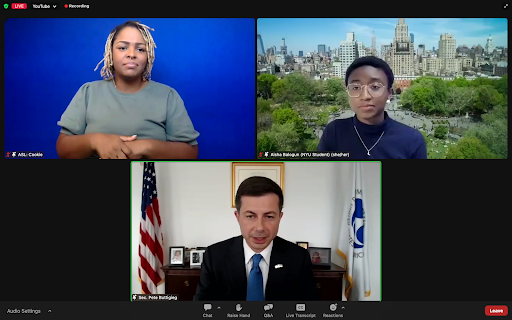Pete Buttigieg talks transport, climate inequity at NYU panel
The U.S. Secretary of Transportation joined industry experts to discuss the importance of infrastructure legislation and its intersection with environmental justice.

Pete Buttigieg speaks to a panel hosted at the Wagner Graduate School of Public Service. (Courtesy of Isabella Tapia)
October 20, 2022
U.S. Secretary of Transportation Pete Buttigieg provided an inside look into the Biden administration’s approach to developing infrastructure projects and the historical injustices in equal access to transportation across the United States at an NYU event on Tuesday, Oct. 18.
Buttigieg joined a panel of experts to discuss the intersection of transportation and climate policies during the virtual discussion co-hosted by NYU’s Robert F. Wagner Graduate School of Public Service and The Century Foundation, a progressive think tank based in New York City that seeks to advance equity in education, healthcare and the workplace.
“We know that the benefits of transportation infrastructure have not been shared evenly or equally in the past in this country — and that goes for everything, from the simple availability or nonavailability of good transit,” Buttigieg said. “Making sure that we have planning processes and policy processes that include the voices of people who have been excluded in the past is critically important to getting this right.”
Before taking office as the transportation secretary in January 2021, Buttigieg ran for president in 2020, but dropped out before the general election due to a lag in support. He was also previously the mayor of his hometown of South Bend, Indiana, for eight years. In joining the Biden administration, he became the first openly gay person to serve in a U.S. presidential cabinet.
In November 2021, President Joe Biden enacted the Infrastructure Investment and Jobs Act, which allocated $110 billion to improving roads and bridges across the country and over $100 billion to public transportation — legislation that Buttigieg played an integral role in passing.
At the event, Buttigieg spoke with panelist Aisha Balogun, a Wagner urban planning student, about Biden’s Justice40 Initiative, an executive order passed on Jan. 27, 2021. The initiative directs 40% of all benefits gained from certain federal investments to disadvantaged communities. Its goal is to address a lack of investment in marginalized communities and specifically allot resources to areas that have been heavily impacted by pollution and climate change.
Sarah Kaufman, the interim executive director of NYU’s Rudin Center for Transportation Policy and Management, led the second half of the panel discussion. She spoke to Peggy Shepard, the co-founder and executive director of WE ACT for Environmental Justice, which is a West Harlem organization that advocates for policies that will counteract environmental racism.
Sonam Velani, the founder and CEO of Streetlife Ventures — a new organization that partners with cities and individuals to counter climate change with investments in infrastructure — spoke about environmental justice and policy. Velani shared more about how her organization aims to make cities more sustainable and accessible.
“It’s not about scarcity and sacrifice, but very much so an optimistic and action-oriented response to climate doom and gloom with a focus on equity — and really getting it right from the start,” Velani said.
Americans are divided over the immense cost of enacting new climate policies, according to a July 2022 poll. A majority of Republicans say that the expense of national climate bills will hurt the economy. Shepard and Velani both defended the climate policies they discussed, emphasizing that they believe the policies’ importance outweighs their economic cost.
“We have to communicate the cost of doing nothing,” Shepard said. “The cost of doing nothing when we don’t invest in our roads, we don’t invest in our purchase, or we don’t invest in transit, — that is the main method for people to get to work in New York City. When we’re looking at the cost benefit analysis — which government generally does — what’s the cost of actually doing nothing? And what will it cost later to make these enhancements?”
Contact Isabella Tapia at [email protected].























































































































































